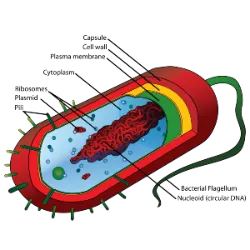Prokaryotic and eukaryotic cells

In nature, it is possible to distinguish two basic types of cells:
Prokaryotic cells: This is the simplest cell, as its genetic material is not organized inside a nucleus and it does not have most of the organelles or cellular structures of more complex cells. Bacteria are prokaryotic cells.
Eukaryotic cells: This is the most complex cell, with an organized nucleus that contains the genetic material inside. It also has a variety of organelles in the cytoplasm, such as mitochondria, which do not exist in prokaryotic cells. All living beings, with the exception of bacteria, have this type of cell. This is the case of plants, which are made up of eukaryotic plant cells, and animals, which are made up of eukaryotic animal cells.
Did you know?










